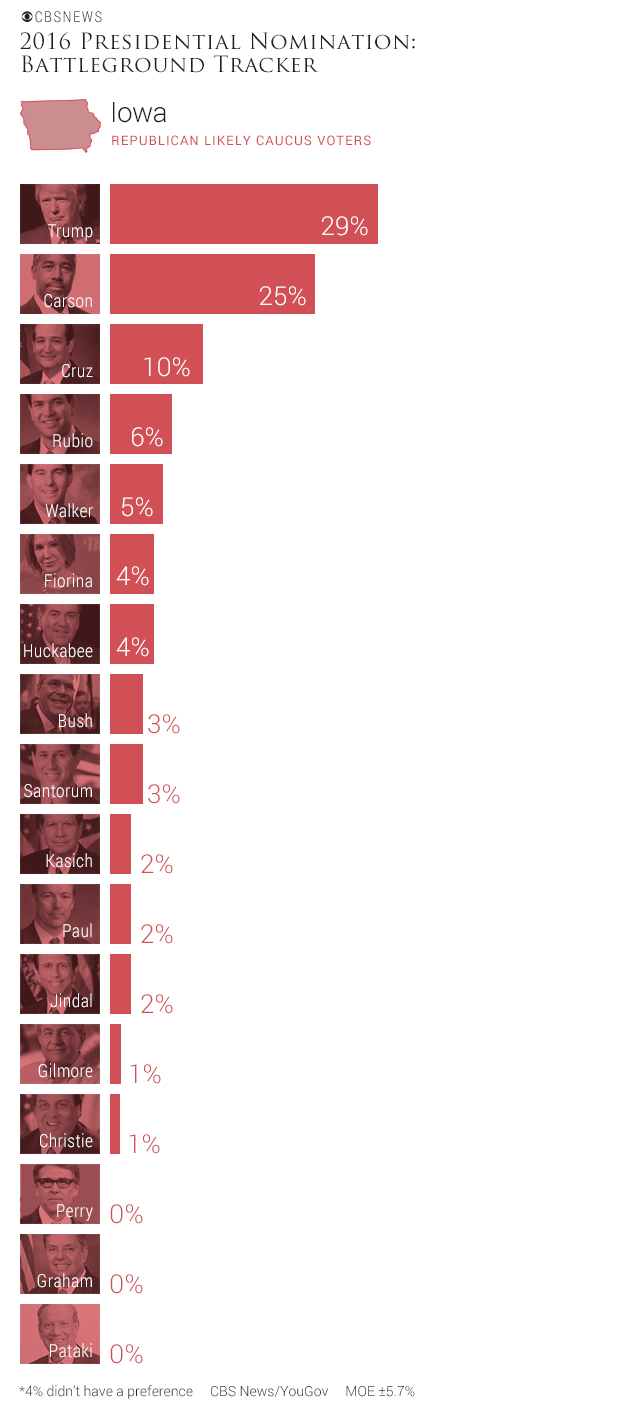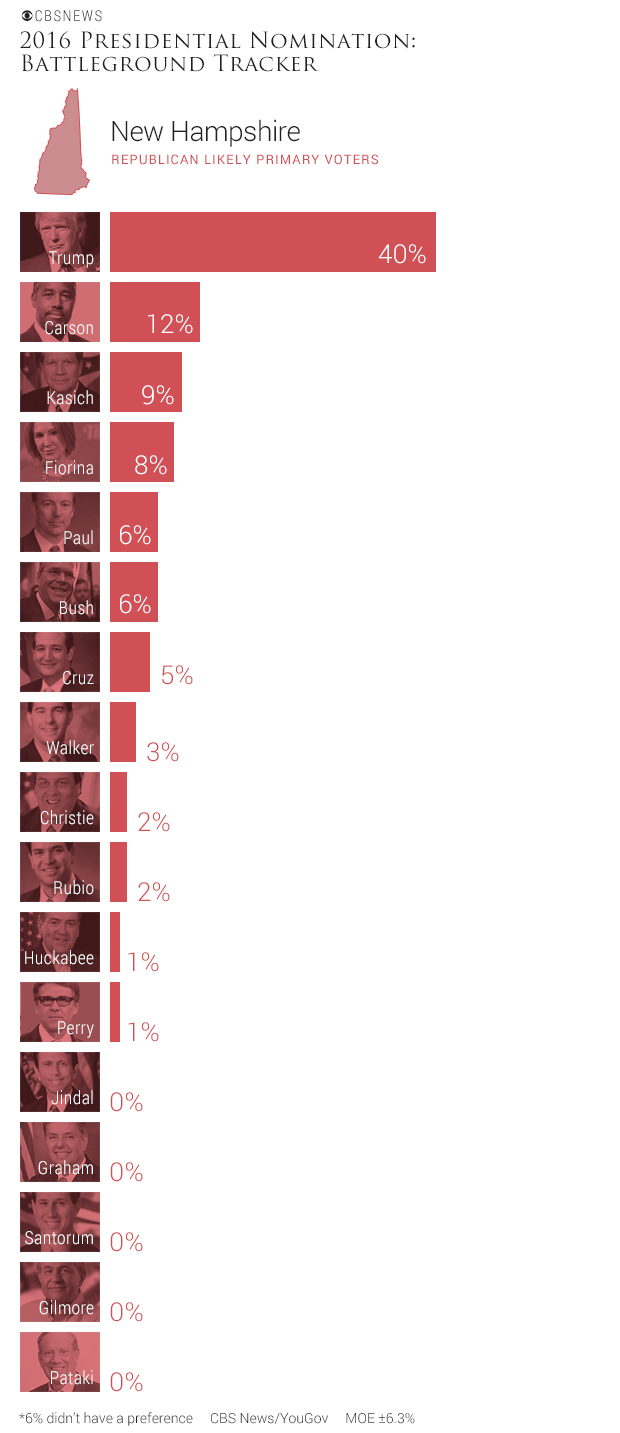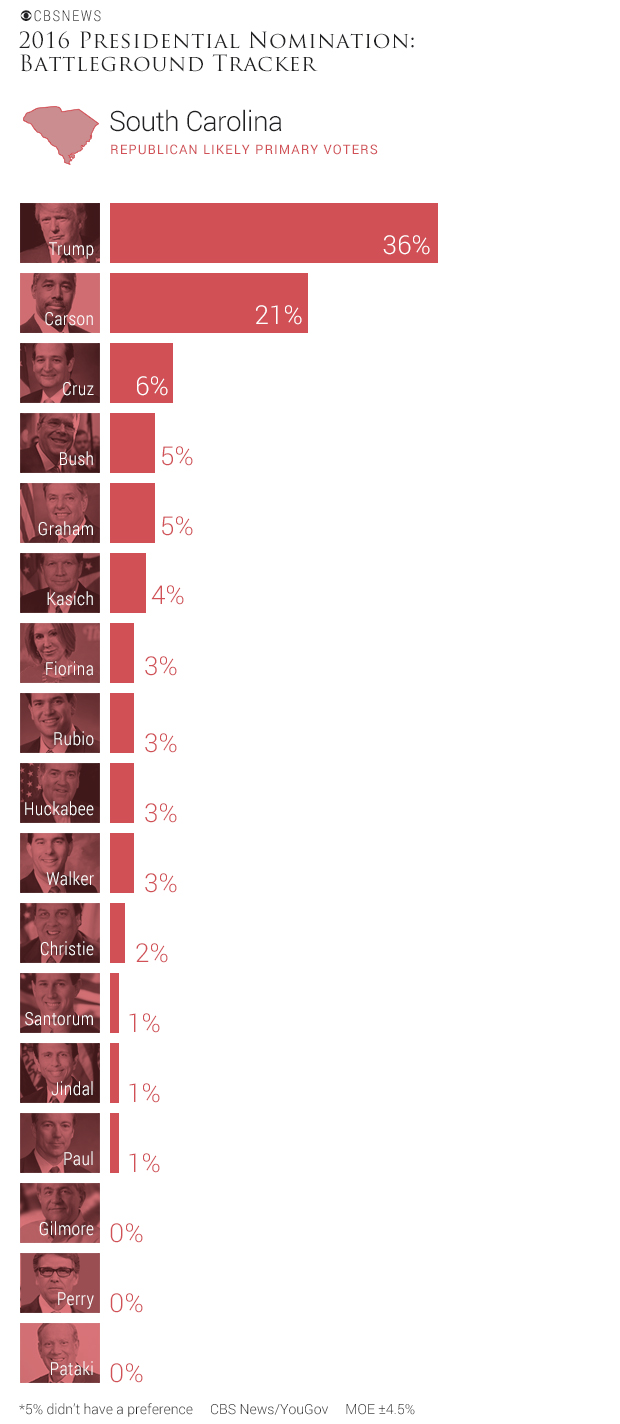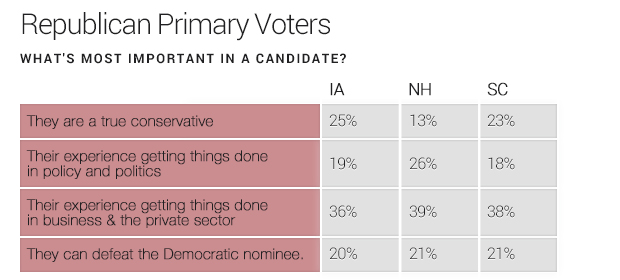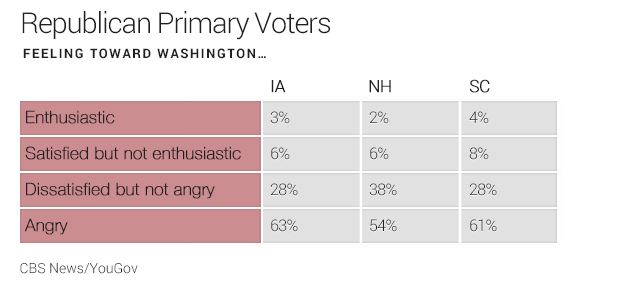Battleground Tracker: Trump leads GOP field in IA, NH, SC
By Anthony Salvanto, Fred Backus, Jennifer De Pinto, Sarah Dutton
Showing no signs of a slowdown heading into the fall, Donald Trump leads the Republican Presidential field in each of the early voting states of Iowa, New Hampshire and South Carolina. Trump's lead in New Hampshire is especially large and he's up double-digits in South Carolina. In Iowa, it's become a two-man field for the moment, as Dr. Ben Carson is closer to Trump than anyone in any state, and together the two political newcomers have distanced themselves from the rest of the pack.
While he leads, very few of the voters backing other candidates pick Trump as their second choice: just one in ten of them do. So together that forms a picture of the field where Trump is a known commodity and voters are either with him or not. Ben Carson, on the other hand, gets the largest percent for second-choice in all states, suggesting that he could be positioned to move up further.
Trump's business experience jibes with what voters say they're seeking. Atop the list of criteria for choosing a candidate is experience getting things done in business and the private sector: just over a third of Republican primary voters in Iowa, New Hampshire and South Carolina choose it. That number outpaces those who say they're looking for a "true conservative," which may help explain why his rivals' attempts to challenge Trump's conservative bona fides haven't moved the needle.
Electability is less of a priority, perhaps reflecting just how far off the general election contest still is.
But that also looks like a continued backlash against the political process itself: significant numbers of these Republican voters express anger toward Washington.
That anger isn't entirely rooted in impatience with gridlock, though. There's frustration among many conservatives - particularly in Iowa and South Carolina - that the GOP-controlled congress has compromised too much with the Obama administration in recent years: 81 percent in Iowa and 72 percent of South Carolina voters think the Republicans in Congress have compromised "too much" with President Barack Obama. New Hampshire Republican voters are less inclined to say that, although a majority - 59 percent -- still do. Twenty-one percent of New Hampshire voters say Congressional Republicans have compromised with the President about the right amount, and another one in five says there has been too little compromise - a sentiment that fewer share in Iowa and South Carolina.
Previous polling has shown increasing concern among Republican voters about inequality in the U.S. economy and the fate of the middle class, and some of Donald Trump's ideas for taxes on hedge fund investors may have sought to tap into that. Voters in all three states were asked about the general idea of raising taxes on Wall Street firms and it drew mixed reviews, with many unsure how they felt. Among those with an opinion, voters in Iowa and South Carolina are more apt to oppose that idea rather than favor it. But in New Hampshire it's the reverse - there, more voters favor raising taxes on Wall Street than oppose doing so.
In drawing close to Trump in Iowa, Carson relies on the support of evangelical voters - he leads among them there. But Trump leads among evangelicals in South Carolina. The two roughly split tea Party supporters in Iowa, which is one reason Carson is closer there, but Trump has large leads with the Tea Party in New Hampshire and South Carolina.
Trump does better with men than women, but nonetheless leads the field with both in New Hampshire and South Carolina and is almost even with Carson among women in Iowa.
Most of Trump's backers are enthusiastic about him, which may add a challenge for rivals trying to unseat him. 65 percent of his backers are enthusiastic in Iowa, only 32 percent are supporting him with reservations. In New Hampshire, 56 percent are enthusiastic and 62 percent in South Carolina. Across the entire field, at least half of Republicans in each state are enthusiastic about their current choice, whoever it is. No other candidate receives enough support to measure the enthusiasm of their voters against Trump's.
Senator Ted Cruz cracks double-digits in Iowa but still lags Carson and Trump. Governor John Kasich has his relatively best showing in New Hampshire of the three states, where he is at nine percent and third place. Carly Fiorina is just behind him at eight percent. Jeb Bush also does his relative best in New Hampshire but is in single-digits there, as he is in Iowa and South Carolina too.
Because it's only September, all of this might tell us more about the voting public's mood than predicting who'll win or how the race will unfold over the coming months. Another debate this coming week could well bring more changes, and the field remains fractured. Moreover, primary elections - especially in Iowa and New Hampshire - historically break very late, with many who decide within days of the contest. At this moment, what is clear is that Republican voters and conservatives are prioritizing experience outside of politics -- and aren't in a mood to compromise.
Link to full poll results here.
The CBS News 2016 Battleground Tracker is based on interviews conducted on the internet between September 3 and 10 with 4,860 registered voters in Iowa, New Hampshire, and South Carolina. The poll was conducted by YouGov, an online polling organization. The "margin of error" is an approximate 95 percent confidence interval for the sampling proportion.
Respondents were selected for participation from available panel members to be representative of registered voters from each state in terms of age, race, and gender. A propensity score (based upon a case-control logistic regression including age, race, gender, education, born-again status, and party registration) was estimated for each respondent and responding panelists were post-stratified upon propensity score deciles. A score for likelihood of voting was computed for each respondent based upon past turnout and self-reported likelihood of voting in the presidential primary.
Respondents were selected from YouGov's and two other online panels and YouGov also randomly selected persons from voter registration lists who had previously voted in primary elections and contacted them by phone. A total of 19,047 registered voters were contacted by phone and the YouGov sample includes 1,163 phone recruits. A complete description of the methodology is in the link below.
The document below describes the poll's methodology and margin of error in detail.
